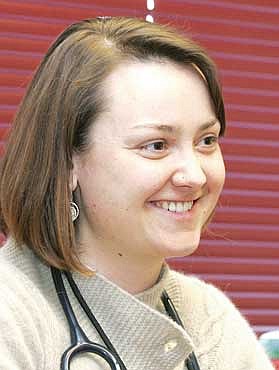Living, working the rural life while learning on the job
Nestled in the Rocky Mountains in the heart of Kootenai Valley, Libby’s beauty and remoteness are known more for attracting outdoorsmen than providing a resource for medical training.
The humdrum of a small town doesn’t evoke exhilarating images of medical students huddled to observe open-heart surgery or brainstorming diagnoses for unusual diseases.
However, Libby has hosted medical students for a few decades now, offering future doctors a glimpse into rural medicine and lifestyle of a small community.
Emily Beck, a third-year medical student at the University of Washington School of Medicine, began her family medicine clerkship last week under Dr. Greg Rice at the Libby Clinic.
“Because I haven’t had any family medicine (training) yet, I’m thinking ‘Wow!’” Beck said last week. “I’m seeing everything so far: old people, young people, babies – I watched a c-section just this morning.”
Beck is part of the WWAMI (an acronym for Washington, Wyoming, Alaska, Montana and Idaho) Rural Integrated Training Experience, or WRITE program, which sends third-year medical students to hospitals and doctor’s offices in 11 rural communities.
A few years after launching the program, UW School of Medicine representatives approached Rice about hosting a WRITE student. Rice had already mentored students and family medical residents for years since moving to Libby in 1977.
Rice accepted his first WRITE student 11 years ago.
“The big benefit is that it’s stimulating for us (doctors),” Rice said. “It keeps our older minds young. It’s healthy for the hospital, the community and our office.”
Rice pointed out that mentoring medical students with the help of other Libby doctors also has tangible benefits. Dr. Jana Hall, who works at the Lincoln County Community Health Clinic, was introduced to Libby when she was a WRITE student in 1999.
“It’s not easy to recruit family doctors,” Rice said.
While Rice is Beck’s primary mentor, she will also take turns shadowing the other Libby Clinic doctors, Glenne Gunther and William Cuskelly. Beck observes and participates at the clinic and is also on-call with the doctors, shadowing them as they admit patients to the hospital and perform follow-up care.
Nine students are participating in the UW School of Medicine’s five-month WRITE program this year while the other approximately 180 students are obtaining their clerkships through traditional rotations at Seattle-area hospitals.
The program differs from hospital rotations in a few ways.
“The idea is to see what rural medicine is like and give you exposure to continuity of care.” Beck said. “Being in one place for five months, you see the same patients over and over again and establish those relationships.”
Beck pointed out that in the WRITE program, she can follow the medical care of a pregnant woman through birth and postnatal care.
Another advantage is that Beck will not have to compete with other medical students.
“They get a lot of supervision under the WRITE program because there’s only one student,” Rice said. “This part of the education is really based on doing things under supervision.”
Lewistown is the only other Montana community that hosts WRITE students. Rice speculates it might have something to do with all the “paper-shuffling” that being a host entails. He gives his wife, Susie, credit for taking care of the logistical side.
“I have a wife who’s a very good organizer,” Rice said. “She coordinates a lot for the students.”
Rice and his wife own a house where medical students stay, and Susie helps students settle in to the new community.
“My wife makes sure the students don’t get lost in the shuffle,” Rice said. “First of all, she finds out everything about the student and puts them at ease.”
Beck recalled being uneasy about broaching the topic of her German shorthaired pointer Annie coming along with her.
“Before I could even get a chance to ask, Susie was like, ‘Oh, you have to bring your dog. You can’t go five months without your dog,’” Beck said. “The Rice’s are really aware of making us feel welcome.”
Beck has been consulting health-care professionals around town for ideas for her community health project, a WRITE program requirement. Last year’s student provided nutrition education for Latina women and children in Libby.
“I want it to be something that will be worthwhile for the community,” Beck said, “not just something that fulfills the requirement.”

